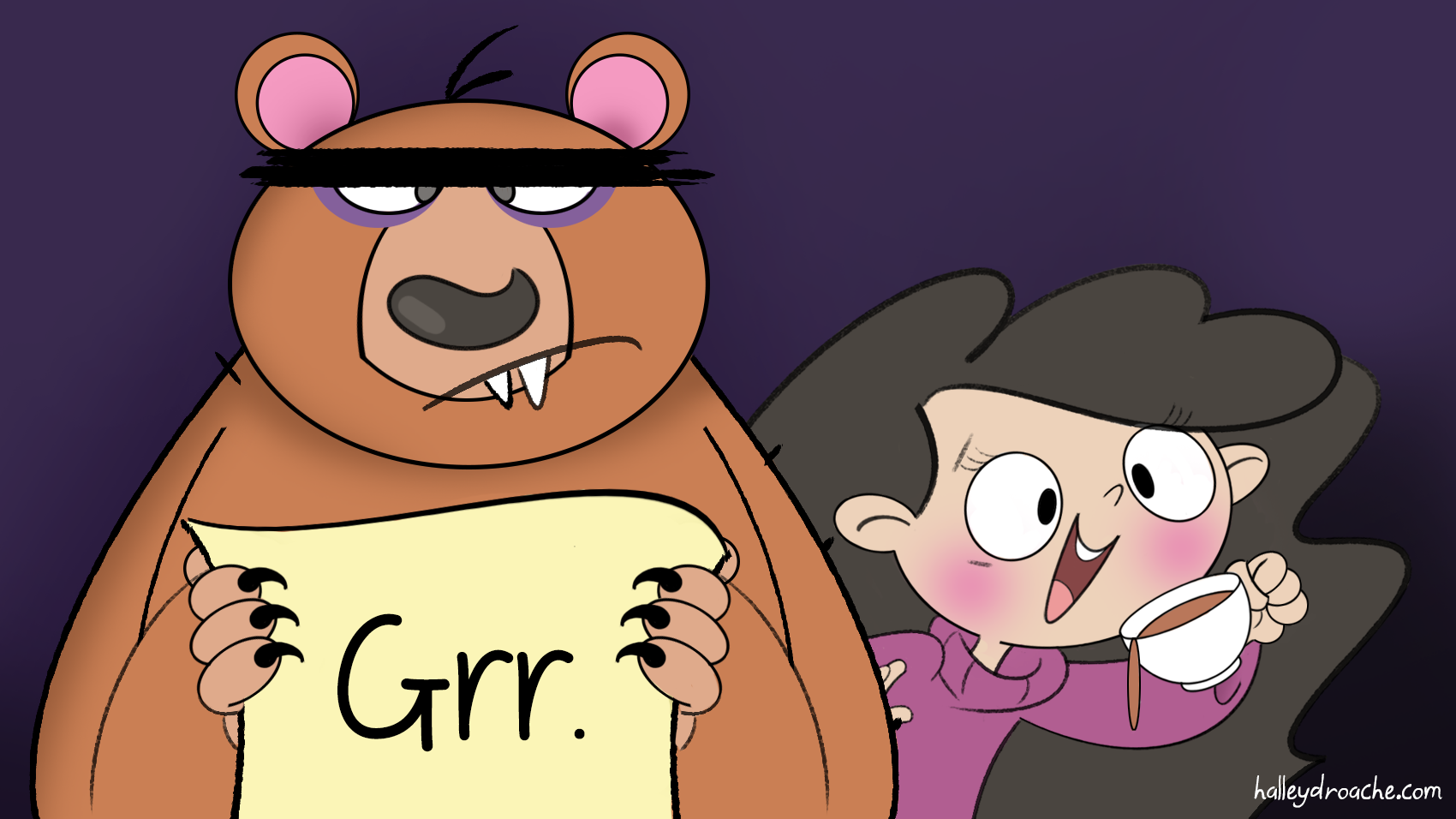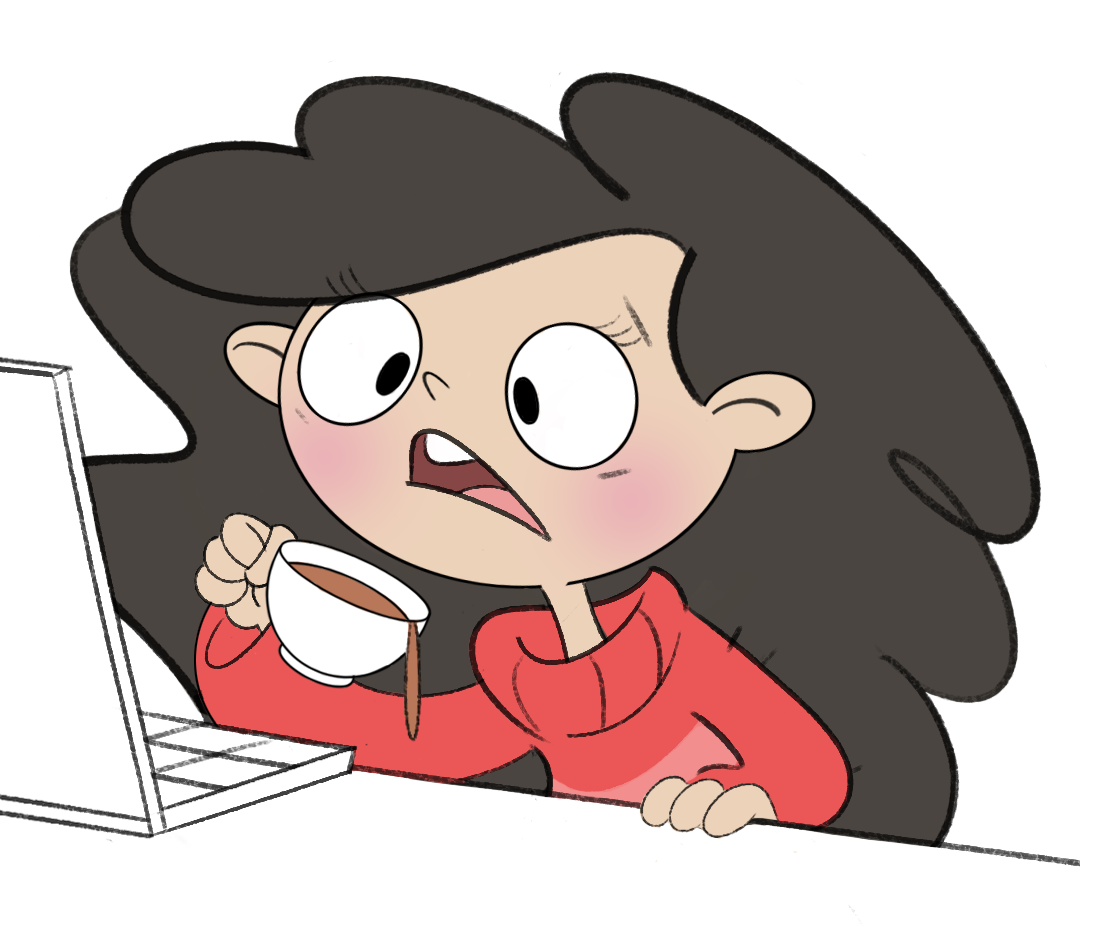How to Write Your 1st Draft (Without Getting Eaten by Angry Bears)

Imagine you’re in a forest.
A deep, spooky forest in the middle of who-knows where. You’re lost. You’re cold. You’re tired. And worst of all? Your flashlight just ran out of battery juice, so you’re just sort of stumbling around, blindly making your way through the dark.
Sometimes, that’s what writing feels like. The forest is your wild & untamed 1st Draft and actually finishing it–aka finding your way out–can seem like a pretty impossible feat. I know, because I’ve been lost myself for months. But as scared as I am, I’m also rather decent at surviving. I know where the tastiest moss is, for example. And have not yet been eaten by angry bears.
This, I feel, makes me a sort of expert. Like, I’m basically the Les Stroud of drafting now. So tonight I’m sharing 5 of my best drafting-survival tips. They’re 150% guaranteed to help you cope in the wilderness. And by ‘150%’ guaranteed I mean more like 50% guaranteed, probably. But if you squint it’s kinda the same thing.
Anyway, all ready?
Here’s Tip #1.

This is ironic advice from me. I mean, most days I’m a ball of anxiety held together by hope and peanut butter. BUT if you’re lost in the forest, panicking is probably half the reason you’re lost in the first place. And as hard as it is, it helps to start seeing the forest as a nice place to be. Chances are there was a time when you used to love it in there, right? A time when you didn’t know there were angry bears at all, and just figured the whole place was filled with happy tree gnomes. Try to get back to that mindset.
It’s different for every writer, but here’s how I do it:
- Before I write the real draft, I write each scene as a little screenplay. That way I’m under no pressure to attain instant narrative prose-perfection, and end up freaking out much less.
- I write the easiest and most exciting of those scenes first.
- I always start with dialogue, then move on to the action, description, etc. Just because I find dialogue a lot more fun.
…And if that doesn’t work? Try taking a break. Eat those cookies you packed. Drink some tea from your handy hip-flask. Sometimes not-writing is just what you need to calm down, and (from my experience, at least!) afterwards it’s way easier to figure things out.

Okay, so for some reason you don’t have a map. Or maybe you do have one, and it’s so badly drawn it’s no help at all. Like, all the landmarks are in the wrong spot, north is actually west and the angry bear caves aren’t labeled clearly enough. If that’s the case, no worries. In the drafting-forest you can make a new map anytime, anyplace. Sometimes a point-form list of ‘big events’ in your story is good enough. But if you prefer a more detailed approach (like me, I love details) you can use one of the following as a guide:
…I also have a guide to mapping individual scenes, which you can find here.

I’m not talking about actual food, just to be clear. If you’re out of tea and cookies you can eat some pine needles. You’ll probably be fine. I’m talking about brain-food. As in the stuff that inspires you, the stuff that gives you new ideas. Sometimes, when you’re lost in the forest, you’re so busy panicking it’s easy to forget your brain needs food at all. But a bit of inspiration might be just what you need to get un-lost, you know? It might set you on a better path.
Personally, my favorite kinds of brain-food are:
- BOOKS. All the books! The more I read the better I write, typically.
- PODCASTS. Especially 88 Cups of Tea & Writing Excuses, because they’re stuffed with advice from successful, published writers. Writers who’ve been lost in the forest oodles of times, and have always found their way out.
- PINTEREST. Because I find visual ref. for characters there. And for settings, magical creatures, big scary weapons–pretty much everything, really.
Just don’t spend TOO long on Pinterest. It’s like, a whole other forest to get lost in.

This, perhaps, is the most important survival tip there is. Find a Big Stick. Pick up that Big Stick. Carry that Big Stick with you at all times. Because as you’re stumbling along, trying to find your way through the forest, you might just fall into a hole. And not just any hole.
A hole full of angry bears, obviously.
And snakes.
And assassin-hedgehogs wielding tiny, poison-dipped daggers.
They’re your fears and doubts. The voices in your head saying your story’s stupid–or worse, that you’re stupid, and nothing you write is even CLOSE to good enough.
Your Big Stick is your only defense. In other words, it’s the thought that motivates you to write anyway. It’s also the reason you started this crazy trek to begin with, even if you’ve somehow forgotten it along the way.
Personally, I’m very prone to falling into holes. So I carry not one, but 3 Big Sticks with me at all times. They are as follows:
- The thought that my book could bring readers happiness/ give them a place to escape to when anxious or depressed.
- The thought that my book will give biracial girls the rep. they need, because the stories I loved as a kid didn’t have any characters that looked like me.
- The thought that I’m a mortal human, with a finite time to live. Because when I’m wrinkly and 103, ready to cough out my last breath, I’d like to be comforted by the fact that I’ve written a lot of things that will far outlive my wrinkly self. Otherwise I’ll have to start making Horcruxes, and nobody wants that.
Once you’ve fought off the angry bears, snakes, etc, you’ll be able to crawl out of the hole. Which brings us to the last and final tip:

That’s it. It doesn’t matter how slow or fast you are, or how many breaks you take along the way. Whether you’re writing consistently every day, once a month or just a few times a year, eventually you’ll end up with a book. That’s how it works.
The only way you won’t end up with a book is if you quit. So even if you’re sick from eating all those pine needles, or the whole forest is on fire, or the angry bear that scratched you was actually a werewolf (or werebear, maybe??) and you’re worried your transformation has already begun, just keep moving. Keep moving and it will totally get better, I swear.
Personally, I keep track of what I DO write, even if it’s just a few sentences a week. I find it makes me way more motivated. You can check out that tracker (right here!), if you want to follow along.
Meanwhile, did I miss any important survival tips? Have more brain-food suggestions, or want to share your own Big Stick? Let me know in the comments! I really love hearing from you.
 Halley D. Roache
Halley D. Roache


I love this approach. The metaphor is dead-on.
My big stick is silence. Going quiet and letting the creative solution come to me.
Really nice read, Halley.
Thanks so much! Silence is such a fantastic Big Stick – it’s always cool when your subconscious figures out writing problems without you consciously trying C:
Seriously this post spoke to me in so many ways… Particularly finding brain-food and being an anxiety ball held together with hope and peanut butter. In my case, it’s hope and caffeine. Yes, I appreciate my tendency to feed my anxiety with stimulants isn’t the best combination.
I’ve just discovered your blog through Bree’s Goodread group and I love your writing! Looks like I have a lot of catching up to do, though I’ve got to say the Pinterest cake on the villain page just completely freaked me out XD
Thanks so much, Melanie! I often worry that my writing style is a bit too over-the-top, so I really appreciate the kind words C: I just checked out your blog and absolutely love it. I’m going to leave a link here so anyone that stumbles on this post can check it out:
https://melanierousselfiction.com/
(And YES come to think of it, I am 100% held together by caffeine too)
The ‘memento mori’ big-stick is one I particularly identify with. It may sound overly dramatic, but when I imagine that I’m about to die, and think about what I regret the most, I think it would be the story that is in my head that remained untold. Yes, it’s a first world problem — because I’m pretty satisfied with my life otherwise. Most of the mundane things in everyday life boils down to maintaining one’s existence; they are means, not ends, and this becomes clear when one pretends that one is about to die. The only end that I, personally, can readily think of wanting, is being a storyteller. 🙂
Wow, that’s so eloquently put! I always think about how much I would regret not telling my stories as well – I’d be very grateful to just live a comfortable life, but I need to bring my characters to life to be truly happy C: